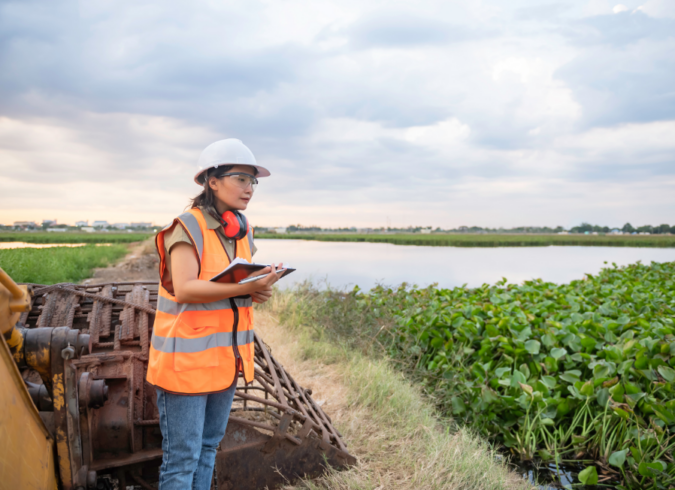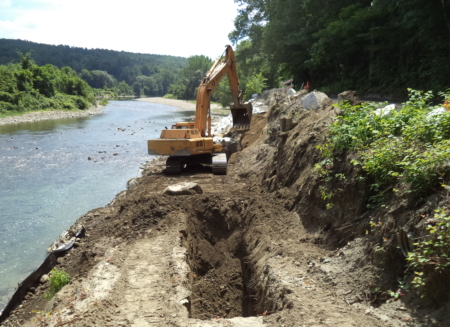Women in Construction Week aims to help raise awareness of the lack of women in the field and works to emphasize the growing role of women in the industry. According to the U.S. Bureau of Labor Statistics, women comprise only 10.9% of all people working in construction. With over 80% of construction companies struggling to find workers, there has never been a more important time to build a diverse and inclusive workforce. While Women in Construction week this year runs from March 5 to March 11, the initiative to attract women to the industry should be an endless pursuit.
At Sanborn Head, we take pride in our women employees who contribute to all areas of our business and continue to excel in their fields of practice. Their hard work, organizational dedication, and contributions to our projects and our firm provide invaluable employee engagement, allow us to achieve professional and industry recognition, and help set higher standards within our industry.
To get a sense of what the current conditions are for women in construction, Nisha Mohanan, Project Director in our Development Client Service Area based out of our Horsham, Pennsylvania office, spoke with a few women at Sanborn Head in different market sectors and geographies and asked them to share their experiences climbing the corporate ladder. Below are some excerpts in their own words (edited slightly for length).
Nisha Mohanan: Could you share your job title and role here at Sanborn Head?
Cynthia Bova: I am an environmental scientist in our Industrial Client Service Area based out of our Concord, New Hampshire office.
Corinne Disenhof: I am a Project Manager in our Development Client Service Area based out of our Westford, Massachusetts office.
Laura Tracy: I am a Senior Project Engineer in our Solid Waste Client Service Area based out of our Burlington, Vermont office.
Nisha: Who or what has influenced you to get where you are today?
Corinne: I took a circuitous path to get here from undergrad, including changing careers and going back to grad school after several years in a research role. I’ve had many influences along the way, including my amazingly supportive parents as well as my undergraduate and graduate advisors, Dr. Laird and Dr. Benoit of the University of New Hampshire, and my mentor at my previous job, Kelly Rose with NETL. One of the reasons that I chose Sanborn Head over other opportunities was because there were many women in leadership positions here.
Cynthia: My family has played a huge role in pushing me to be where I am today. I grew up always being outside and enjoying the environment. My immediate family all works for my father’s general contracting business, but I knew that I didn’t want to go into that business. So, I turned my love of the environment into my career. Once I got into the University of New Hampshire, I met amazing female professors who encouraged me to be another strong woman in STEM, and after starting work at Sanborn, Head & Associates, I knew I made all the right choices!
Laura: My mother has had a large impact on where I am today. She is a contracts manager for a large firm and has always been an amazing example of a hard-working, confident woman working in an industry typically made up of men. She has influenced me to go after the things that interest me and to apply myself even when it may be hard.
Nisha: What makes a project rewarding or exciting for you?
Corinne: Interesting geology and geotechnical challenges create exciting projects, and it’s rewarding to see a new building completed and know that Sanborn Head was a part of it.
Laura: A project is rewarding when I feel like we have put out the best quality work and delivered a product the client will be happy with. It is exciting when the work to be accomplished is diverse and you are able to learn something new in the process.
Nisha: As a woman, what are some of the challenges you faced in building your career?
Cynthia: Some challenges I face every day in my career as a woman is feeling safe and feeling heard. Being in the field always poses some risk. As a woman, we do not always feel safe being alone, and in certain situations even with a buddy, so I feel women always need to be aware of their surroundings. As far as having our voices heard, I believe women need to push to show others that we also deserve a seat at the table but in a way that is not overbearing since we can also face many double standards. As a young female, often others on jobsites assume that I am not in charge or able to do certain things, and people can tend to look at the older folks and men in the room even though I am fully capable of accomplishing many things.
Laura: As a woman building my career, I have faced challenges that stem from various insecurities. When you are one of the few females in the room it can be hard sometimes to push aside feelings that you don’t belong, a form of imposter syndrome. I have learned through school and my job that everyone is on their own journey and we are all capable, despite any gender stereotypes.
Nisha: What do you think the challenges are for young women starting their professional journeys today?
Laura: Some challenges young women starting their professional journeys may face include people not taking what you say seriously or needing to follow up with someone else to confirm what you told them. It is unfortunate, but being young and female on a construction site can lead to other people questioning your knowledge of the project and the processes involved.
Corinne: While the number of women in STEM fields is growing, geotechnical engineering and construction are still heavily dominated by men. Misogynistic behavior on construction sites still exists, and it may or may not be blatant. The social challenges that have hindered women in most industries for decades also haven’t changed; in particular, inflexible schedules can make the balance between work and family life difficult, especially for entry-level positions where schedules are often dictated by client’s construction needs.
Nisha: What non-technical skills have you developed during your career that have been essential to your success?
Corinne: Having strong communications skills is critical in this industry, particularly with colleagues, contractors, and clients.
Laura: Some of the non-technical skills that I have learned through working as an engineer at Sanborn Head can be directly linked to my answer about the challenges women face starting out a career in construction. I have learned to be confident in myself and in my knowledge by learning as much as I can about a project and the related work so that when I explain something or a question is asked of me, I can give a quality response.
Nisha: Do you have any advice for women thinking about starting a career in the construction industry?
Laura: My advice to women thinking about starting a career in the construction industry would be to gain experience. Take an internship that involves field work, it’s really the best way to really know if boots on the ground work is right for you. Get to know yourself, do you like the outdoors and interacting with a diverse group of people? You may have to work just a little harder to be heard or respected but it can be the most rewarding part as well.
Corinne: Don’t be afraid to stand up for yourself. Be willing to learn and learn to communicate well in multiple formats – in person, virtually, in writing, and over the phone. Be professional, but don’t put up with misogyny.




